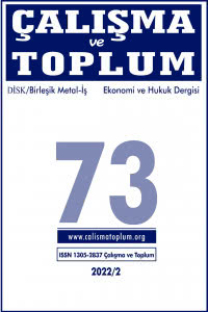Türkiye Solunun Aşil Topuğu: 1960-1971 Yıllarında Türkiye Solundaki Devlet Tartışmalarının Karatani’nin Sermaye-UlusDevlet Çerçevesinden İrdelenmesi
The Achilles' Heel of Turkey's Left: An Analysis of the state within the debates of the Turkish left of 1960-71 from Karatani's Capital-Nation-State Framework.
The purpose of this article is to provide an account of how leading radical leftist movements in Turkey in the period between 1960 and 1971 conceptualized the state in political debates on structural features of capitalist social formation in Turkey and strategies for transition to socialism. The analytical framework of the article draws on the mode of exchange framework developed by Japanese Marxist theorist Kojin Karatani in his paradigm-shifting work The Structure of World History. Building on Marx’s concept of capital, Karatani attempts to explain the basis of social formations and their historical developments in terms of “modes of exchange” rather than “modes of production”. Karatani argues that modern capitalist nations are composed of a mutually interdependent tripartite system of capital-nation-state. This capital-nation-state operates as an interlocking, self-reinforcing, independently autonomous system creating a “Borromean knot”. Thus he proposes a shift in the base of the Marxist metaphor of base/superstructure from “modes of production” to “modes of exchange” over which the tripartite system of capital-nation-state forms the superstructure. In this sense, Karatani reconstructs Marxist theory of social formation in such a way that capital, nation and state- seen as constitutive elements of the superstructure- form an inseparable amalgamation in which each constitutive element keeps sustaining its own autonomy. This system emerged first in Europe by relying on the interlocked system of commodity exchange of capital power, “plunder and redistribution” of state power and “reciprocity” of community power. The interdependence of each element of the Borromean knot and the tendency of accumulation of industrial capital through vertical lines over geographical areas has transformed the rest of the world, and has become the dominant form globally. Karatani’s review of world history notes that anti-capitalist movements can destroy Borromean knot system of capital-nation-state only by targeting them simultaneously, making the component elements mutually exclusive and thus depriving each of the necessary interlocking mechanism to survive. Radical leftist movements of Turkey in the 1960s discussed the political role of bureaucracy and the relative autonomy of the state especially in connection with the 1960 military intervention and revisionist Soviet theses of the time. They generally explained the relative autonomy of the state based on the dominant mode of production in Turkey, which was, for them, still “semi-feudal” and hence the relative weakness of the bourgeoisie. However, radical left movements failed to understand fully the fact that the proletariat of Turkey was trying to protect itself from the state’s political project geared toward making the commodity mode of exchange dominant through destructive assaults on traditional communities. In other words, radical left movements failed to recognize the proletariat’s desperate search for a genuine political representative of their own. Eventually the proletariat found this representative in the right-wing political parties which had appropriated these communities and their demands into the right-wing political discourse as the “nation”. Some intellectuals within radical left movements, such as Aybar, Boran, Kıvılcımlı, Divitçioğlu, and Küçükömer had sought for theoretical explanations to grasp the state’s role in capital accumulation which had worked against the proletariat and poorer segments of Turkish society. However, most radical left movements of the time were unable to appreciate the importance of popular resistance against the state’s destruction of traditional communities, which was politically capitalized by right-wing political parties and thereby the bourgeoisie.
